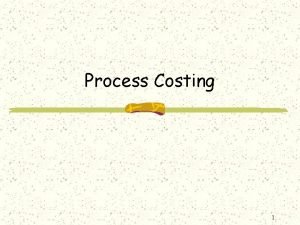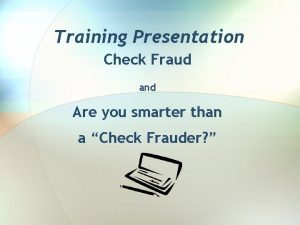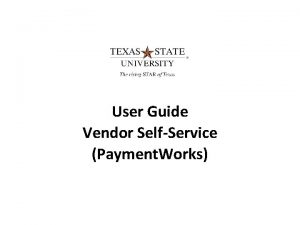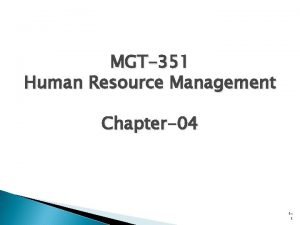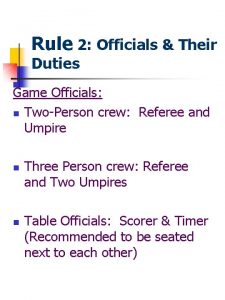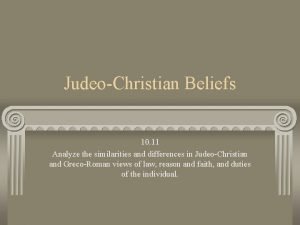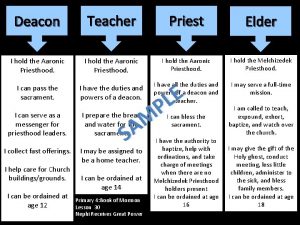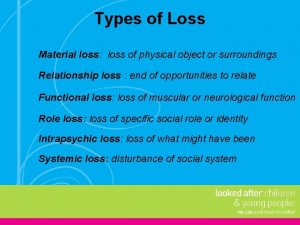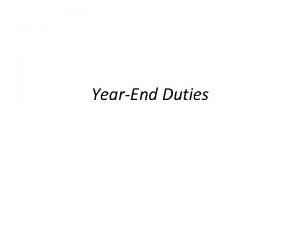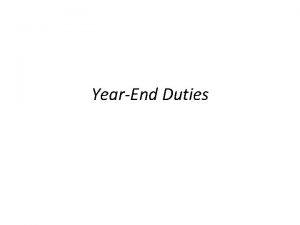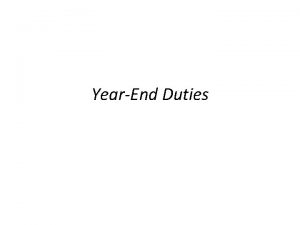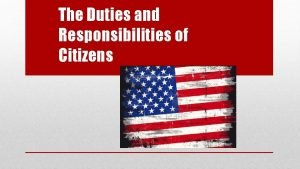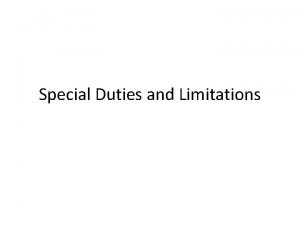DUTIES TO A MORTGAGEE OR LOSS PAYEE A


















- Slides: 18

DUTIES TO A MORTGAGEE, OR LOSS PAYEE: A PRIMER Ken Maguire, Esq. Kate Maguire, Esq.

Loss Payable Clause Loss or damage under this policy shall be paid, as interest may appear, to you and the loss payee shown in the Declarations or in this endorsement. � In the absence of a provision that the insurance policy shall not be invalidated by any act or neglect of the insured, a “loss payee” is not itself an insured under the policy; it is merely the designated person to whom the loss is to be paid. It is established that such a loss payee may only recover if the insured could have recovered. � Stairway Capital Management II, L. P. v. Ironshore Specialty Ins. Co. , 126 A. D. 3 d 522 (1 st Dep’t 2015).

Alternative Loss Payable Clause � � Where the loss payable clause does include language stating that the mortgagee’s interest in the policy will not be impaired or invalidated by any act or neglect of the named insured. Typically treated like a standard mortgage clause. � White Rose Food Corp. v. N. Y. Property Ins. Underwriting Ass’n, 98 A. D. 2 d 352 (1 st Dep’t 1983).

Standard Mortgage Clause 2. Mortgageholders a. The term mortgageholder includes trustee. b. We will pay for covered loss of or damage to buildings or structures to each mortgageholder shown in the Declarations in their order of precedence, as interest may appear. c. The mortgageholder has the right to receive loss payment even if the mortgageholder has started foreclosure or similar action on the building or structure. d. If we deny your claim because of your acts or because you have failed to comply with the terms of this Coverage Part, the mortgageholder will still have the right to receive loss payment if the mortgageholder: (1) Pays any premium due under this overage Part at our request if you have failed to do so; (2) Submits a signed, sworn proof of loss within 60 days after receiving notice from us of your failure to do so; and (3) Has notified us of any change in ownership, occupancy or substantial change in risk known to the mortgageholder. All of the terms of this Coverage Part will then apply directly to the mortgageholder.

A Separate Contract � � Almost every state finds that the Standard Mortgage Clause creates a separate contract between the insurer and the insured. As a result, the acts or omissions of the mortgagor will not effect coverage owed to the mortgagee.

Coverage or No Coverage? � � � The insured makes a claim for damage caused by fire. During the claim investigation process, the insurer determines that the insured made material misrepresentations on the insurance application, and claimed that the insured had never had a policy cancellation, but in fact had several policies in the last few years cancelled due to nonpayment of premium. The mortgagee knew of the misrepresentations, but did not inform the insurer.

No Coverage! � Weekly v. Missouri Prop. Ins. Placement Fac. , 538 S. W. 2 d 375 (Mo. Ct. App. 1976) � � Citizens State Bank of Dickinson, Tex. v. Amer. Fire & Cas. Co. , 198 F. 2 d 57 (5 th Cir. 1952) � � We think that if the mortgagee was guilty of a wrongful act in failing to make the disclosure to the insurance company, such wrongful act of the mortgagee would prevent recovery. Fidelity-Phoenix Fire Ins. Co. v. Garrison, 39 Ariz. 277 (Az. 1931) � � The clause does not, however, protect the mortgagee when he participates in, or knows, or should have known of, the acts or neglect of the mortgagor. If [the mortgagee] has actual knowledge of any act or neglect that would invalidate the policy, or such knowledge of facts as would induce a man of ordinary prudence to make further inquiries, which would have disclosed acts or neglect by the mortgagor that would void the policy either at its inception or afterward, then the provisions of the ‘union mortgage clause’ will not protect him Rubenstein v. Cosmopolitan Mut. Ins. Co. , 61 A. D. 2 d 1029 (NY 2 d Dep’t 1978) � Where there are issues of fact as to the knowledge of the mortgagee of potential fraud, the insured is not entitled to summary judgment declaring coverage.

Proceed with Caution � Courts are reticent to find evidence that the mortgagee committed any misrepresentations � TBD Capital, Inc. v. Seneca Insurance Company 49 D 02 -1309 -PL-034683 (Marion County 2015); citing Fifth Third Bank v. Indiana Ins. Co. , 771 N. E. 2 d 1218 (Ind. Ct. App. 2002)(Finding no evidence submitted of fraud despite submission of multiple insurance applications containing misrepresentations by the mortgagee)

Coverage or No Coverage? � � The insured files a claim for vandalism to the property. The premises was an owner occupied warehouse. During the investigation, the insurer discovers that the owner had ceased using the premises, and it had been vacant for six months prior to the loss.

The Policy’s Vacancy Provision: 8. Vacancy a. Description Of Terms (1) As used in this Vacancy Condition, the term building and the term vacant have the meanings set forth in Paragraphs (a) and (b) below: . . (b) When this policy is issued to the owner or general lessee of a building, building means the entire building. Such building is vacant unless at least 31% of its total square footage is: (i) Rented to a lessee or sub-lessee and used by the lessee or sub-lessee to conduct its customary operations; . . b. Vacancy Provisions If the building where loss or damage occurs has been vacant for more than 60 consecutive days before that loss or damage occurs: (1) We will not pay for any loss or damage caused by any of the following even if they are Covered Causes of Loss: (a) Vandalism; (b) Sprinkler leakage, unless you have protected the system against freezing; (c) Building glass breakage; (d) Water damage; (e) Theft; or (f) Attempted theft.

Depends on the State � Wisconsin--no coverage � Waterstone Bank, SSB v. Am. Family Mut. Ins. Co. , 2013 WI App 60, ¶ 9, 348 Wis. 2 d 213, 220– 21, 832 N. W. 2 d 152, 156 (2013) The Court found that the damage during vacancy was not a covered risk, and the vacancy provision is not a term or condition, the violation of which by the property owner’s acts would forfeit or void the policy. � Minnesota--no coverage � Commerce Bank v. West Bend Mut. Ins. Co. , 870 N. W. 2 d 770 (2015) Finding a building may become vacant despite an owner’s best efforts.

Coverage � Michigan � Wells Fargo Bank, N. A. v. Null, 304 Mich. App. 508 (Ct. App. Mich. 2014) Where homeowner vacated the premises and thereafter incurred a loss, although the vacancy violated the policy as to the homeowner, because the mortgagee had no knowledge of the vacancy, the mortgagee was entitled to coverage.

Coverage or No Coverage? � � � The insured’s property, which carried a mortgage in the amount of $400, 000 was destroyed by fire. The insured is denied coverage due to his failure to cooperate with the insurer, and refusal to appear for an examination under oath or provide any records. After the fire, the mortgagee commences a foreclosure proceeding, and the property is sold at auction for $400, 000. Mortgagee makes a claim under the policy.

No Coverage (most jurisdictions) � New York � � Whitestone Savings & Loan Ass’n v. Allstate Ins. Co. , 28 N. Y. 2 d 332 (1971) Connecticut � Burritt Mutual Savings Bank of New Britain v. Transamerica Ins. Co. , 180 Conn. 71 (1980) �Finding that, to the extent that the mortgage has not been satisfied, however, mortgagee would be entitled to coverage. � Florida � � Lenart v. Ocwen Fin. Corp. , 869 So. 2 d 588 (Fla. Dist. Ct. App. 2004) Illinois � Western Employers Ins. v. Bank of Ravenswood, 159 Ill. App. 3 d 22 (App. Ct. Ill. 1987) Finding sale of the mortgage to another party after the loss terminates the duties owed to the mortgagee by the insurer.

Coverage is possible � Kentucky � Grange Mut. Cas. Co. v. Cent. Tr. Co. , 840 (Ky. Ct. App. 1989) 774 S. W. 2 d 838, Required insurer to provide coverage to mortgagee even though property has been completely repaired by the mortgagor to whom coverage was denied. � Ohio � Mortgagee's interest in fire insurance proceeds was extinguished to the extent of the payment it received in partial payment of the debt following foreclosure sale, but, as the real party in interest, was entitled to fire insurance proceeds equal to the deficiency remaining after foreclosure sale, $52, 162. 28, plus interest. Barwick v. State Farm Fire & Cas. Ins. Co. , 2011 -Ohio 5689

Coverage or No Coverage? � � The insured files a claim for damage resulting from a burst pipe. During the investigation, the insurer finds that the insured failed to maintain their heat.

No Coverage � Indiana � It is true that certain circumstances, such as an insured's misrepresentations in obtaining an insurance policy, do not affect the separate insurance agreement between the insurance company and mortgagee. See Ocwen Loan Servicing, LLC v. Nationwide Mut. Fire Ins. Co. , 1: 07–cv– 01449–SEB–DML, 2012 WL 1067854, at *7– 8 (S. D. Ind. Mar. 29, 2012). However, although the mortgage clause at issue here provides that a denial of the insured's claim does not necessarily apply to the mortgagee, it still requires that the mortgagee have a “valid claim” for coverage. Thus, contrary to Chase's contention, Chase is not automatically entitled to coverage under the mortgagee clause. To have a “valid claim” under the Policy at issue here, coverage must fall under a named peril. Because genuine issues of material fact remain regarding whether the loss at issue here is payable as a valid claim under the named perils in the Policy, neither Chase nor North Pointe is entitled to summary judgment on this issue. Short v. N. Pointe Ins. Co. , No. 1: 11 -CV-00545 -SEB, 2013 WL 1828024, at *10 (S. D. Ind. Apr. 29, 2013)

� For a 50 State primer, visit our website: � kmlawny. com/LEA
 Scrap account
Scrap account Payee information portal
Payee information portal Sfcu medford
Sfcu medford Payer payee
Payer payee Payee onboarding
Payee onboarding Nova payee services
Nova payee services Participant diary/log
Participant diary/log Nnnn nnnn game
Nnnn nnnn game Disbursing officer duties and responsibilities
Disbursing officer duties and responsibilities Regulatory functions of sebi
Regulatory functions of sebi Sector officer report format
Sector officer report format Judeo-christian duties of the individual
Judeo-christian duties of the individual History of garde manger
History of garde manger What are the function of coren
What are the function of coren Heo job title
Heo job title Wd ross theory
Wd ross theory Barangay health workers duties and responsibilities
Barangay health workers duties and responsibilities Duties of a deacon lds
Duties of a deacon lds What are the duties and responsibilities of nsrc
What are the duties and responsibilities of nsrc
